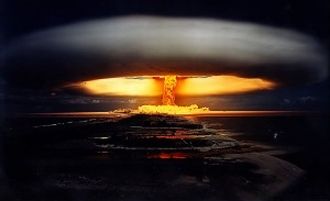|

by Terrence Aym
July 12, 2010
from
Helium Website
|
While the plan
would admittedly only be executed if a worst case
scenario seemed imminent, some geo-chemists have
expressed concerns that detonating a nuke in the Gulf
might ignite the methane. |
(CHICAGO) - In a desperate attempt to stop a huge area of the Gulf
ocean floor from possibly rupturing due to subterranean methane gas
(leading to a calamity no human has ever seen) BP has ripped a page
from science fiction books.
The giant oil company is now quietly preparing to test a small
nuclear device in a frenzied rush against time to quell a
cascading catastrophe.
If successful they will have the
capability to detonate a controlled
fusion generated pulse.

While the world watches BP's attempt to
contain the oil gusher at the former Deepwater Horizon site, company
officials have given the green light on an astounding plan to use
what is known as a nuclear EPFCG
charge if all else fails.
Sea floor
compromised
Reports still indicate that methane is flooding the Gulf waters at a
rate one million times more than normal, and the NOAA research
vessel, Thomas Jefferson has reported spotting new fissures.
[1]
Last week the science ship stunned some reporters with the
revelation that the oceanographic team had discovered and measured a
rift in the ocean floor miles from the BP wellhead. The rift was
reported to be more than 100 feet long and widening. Oil and methane
continues to plume from that rift.
BP has also admitted damage beneath the
sea floor. [2]
The Omega plan
Most enterprises - whether business, government, or exploration -
have a Plan B to fall back on.
To date, BP has attempted Plans B
through N. Yet it is the last ditch plan-the Omega plan-that hold
the greatest risk. Yet that plan may be the final hope to stop what
some insiders now consider a catastrophe that could culminate with a
world-killing mass extinction event that modern civilization could
not survive.
At a
super-secret security base-CFB
Suffield-located in southern Alberta, Canada, area
reports indicate that high level engineers, physicists and military
scientists are feverishly working to complete an ‘explosively pumped
flux compression generator’ (EPFCG).
According to published scientific papers [see sources below] an
EPFCG generator can be powered by a very small, controlled fusion
explosion-in other words, a tiny nuclear bomb.
Why the UK based BP has set up operations at CFB-Suffield is
obvious:
The company already runs three oil
rigs on the base, have worked with Canada’s chemical and
biological efforts on and off for almost 40 years, and have
strong ties to the Commonwealth’s infrastructure.
The CFB Base, which incorporates DRDC
Suffield, is one of research six Canadian military facilities and
critical to the security of the country. DRDC Suffield is the lead
facility for all of Canada’s engineering and weapons systems R&D.
The EPFCG - a
Star Wars super weapon
A device that can only be used once, the EPFCG
generates a high power electromagnetic pulse. It achieves
this by using a powerful explosive, preferably nuclear.
Advanced, nuclear driven EPFCGs can
instantaneously create up to billions of amperes and hundreds of
terawatts. Such raw power exceeds lighting bolts by huge orders of
magnitude.
The pulse can be shaped and directed and used to knock out
electronics-or more importantly in this case - to fuse virtually any
material - including crumbling rock strata deep under the sea. The
fantastically energized pulse can also compress objects to very high
pressures and densities. [3]
According to engineers familiar with the technology, the devices can
generate plasma arcs hotter than the surface of the sun that will
melt and fuse materials in nanoseconds.
A special security force manned by members of
AEGIS, a UK based paramilitary
security corporation similar to the old US
Blackwater Security company, is
reported to have cordoned off the base. The security lid has clamped
down hard while the engineers and scientists work with the nuclear
materials.
BP’s secret Omega Plan kicked off in earnest on July 7th,
2010. According to sources on the base the British Geological
Survey (BGS), the United States Geological Survey (USGS),
BP and Halliburton have set up a test site at one of the drill rigs.
While the plan would admittedly only be executed if a worst case
scenario seemed imminent, some geo-chemists have expressed concerns
that detonating an EPFCG in the Gulf might ignite the methane.
Meanwhile the preparations for the test continue in Canada.
Notes
[1]
Methane in Gulf 'astonishingly
high'-US scientist
[2]
BP Official Admits to Damage Beneath
the Sea Floor
[3]
Explosively pumped flux compression
generator (EPFCG)
Sources -
Scientific papers on a ‘super weapon’
|

